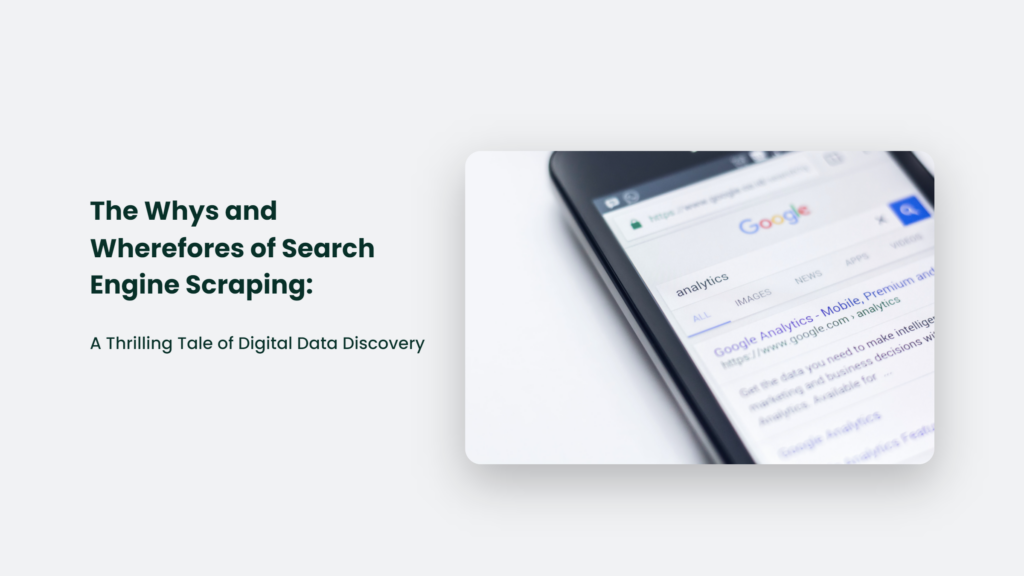

The Whys and Wherefores of Search Engine Scraping: A Thrilling Tale of Digital Data Discovery

As Seen On
I know what you’re thinking: “Search engine scraping? Surely, there’s nothing more tantalizing than this riveting topic!” Well, hold on to your hats, folks, because today, we’re diving deep into the thrilling world of search engine scraping and unearthing the buried treasure of digital data.
Buckle up, and let’s get started! This rollercoaster of a ride will take you through the whys, hows, and don’ts of this data-driven adventure.

Delving Deeper into the Allure of Search Engine Scraping
As we’ve already established, search engine scraping is essential for businesses and marketers in the digital age. But the real magic lies in how this technology can revolutionize your online strategies and give you a leg up on the competition. Let’s delve deeper into the top three reasons that make search engine scraping such an alluring prospect.
Competitive Analysis – A Peek Behind the Curtain
In the cutthroat world of online marketing, knowledge is power. By harnessing search engine scraping, businesses can get an unprecedented glimpse into their competitors’ online strategies. This invaluable intel can help you identify your rivals’ strengths and weaknesses and fine-tune your own approach accordingly.
For example, search engine scraping can reveal:
- Which keywords are your competitors targeting
- How their paid ad campaigns are performing
- The kind of content they’re publishing to attract customers
Armed with this information, you can make data-driven decisions to outperform your competition, whether it’s by targeting less competitive keywords, creating better content, or optimizing your ad spend.
SEO Optimization – The Road to SERP Supremacy
Search engine scraping is your secret weapon if you want your website to rank higher on search engine results pages (SERPs) and attract more organic traffic. By extracting SERP data, you can gain insights into how your website performs compared to your competitors and uncover areas that need improvement.
For instance, search engine scraping can help you with the following:
- Discover high-performing keywords to target
- Analyze the quality and relevance of your backlinks
- Identify technical issues that could be hurting your rankings (e.g., slow page load times, broken links)
With this treasure trove of information at your fingertips, you can optimize your website’s SEO strategy and boost your online visibility – all without breaking a sweat.
Market Research – Unraveling the Mysteries of Consumer Behavior
Understanding your target audience is crucial to the success of any business. By scraping SERPs, you can gain valuable insights into market trends, consumer behaviour, and industry-specific keywords.
This wealth of data can help you create more targeted and effective marketing campaigns, tailor your product offerings, and, ultimately, increase your bottom line.
For example, search engine scraping can help you with the following:
- Identify emerging trends and hot topics in your industry
- Understand consumer pain points and preferences
- Uncover popular search queries related to your niche
By staying ahead of the curve and anticipating your customer’s needs, you’ll be better positioned to create compelling content, develop in-demand products, and, ultimately, dominate your market.
The Art of Search Engine Scraping: A Step-by-Step Guide
Now that we’ve covered the whys let’s move on to the hows. Contrary to popular belief, search engine scraping is not an arcane practice reserved for digital warlocks. With the right tools and a dash of patience, even mere mortals can master the art.
Step 1: Choose Your Weapon (aka Tool)
First things first: you’ll need a search engine scraping tool. Various options are available, from user-friendly web apps to powerful APIs. Some popular choices include:
- Scrapy
- Beautiful Soup
- Selenium
- Octoparse
Choosing a tool that fits your needs, expertise, and budget is essential. For instance, if you’re new to the game and don’t have coding skills, a web-based scraper like Octoparse might be a better fit. However, if you’re a Python aficionado, Scrapy could be your jam.
Step 2: Define Your Quest (aka Set Parameters)
With your tool in hand, it’s time to outline your data extraction objectives. This step involves specifying the target search engine (Google, Bing, etc.), the keywords you want to scrape, and the data points you’re interested in (rankings, URLs, titles, etc.).
Remember, precision is the name of the game. The more specific your parameters, the more accurate and actionable your extracted data will be. And, as Confucius said, “Accuracy is the key to success” (or was it “Better a diamond with a flaw than a pebble without”? It’s hard to keep track.)
Step 3: Launch Your Expedition (aka Scrape Away)
Once your parameters are set, unleash your scraper on the unsuspecting SERPs. Depending on your chosen tool, the extraction process could be as simple as clicking a button or as complex as writing a custom script. Either way, sit back, relax, and let your digital spelunker do its thing.
But beware! Search engine scraping is not without its perils. Search engines like Google don’t take kindly to automated scraping, as it can put undue strain on their servers and violate their terms of service.
To avoid getting your IP address blacklisted or your scraping endeavours thwarted, employ stealth tactics like:
- Rotating IP addresses
- Using proxies
- Limiting the scraping rate
- Randomizing request headers
As Sun Tzu said, “All warfare is based on deception.” Search engine scraping, it’s all about flying under the radar and outwitting the search engine’s defences.
Step 4: Sift Through Your Treasure (aka Analyze the Data)
Congratulations! You’ve successfully scraped your target SERPs and amassed a veritable treasure trove of data. Now comes the truly exhilarating part: sifting through your spoils and unearthing valuable insights that can propel your business to new heights.
Depending on your initial objectives, this might involve analyzing competitor trends, identifying gaps in the market, or fine-tuning your SEO strategy. The possibilities are endless – and so are the rewards.
Just remember the wise words of Sherlock Holmes: “It is a capital mistake to theorize before one has data.” In other words, let the facts guide your actions, and you’ll be well on your way to search engine domination.
Frequently Asked Questions:
Is search engine scraping legal?
The legality of search engine scraping is somewhat murky, as it can vary depending on the jurisdiction and the specific actions taken. In general, scraping publicly available data for legitimate purposes (e.g., market research, SEO optimization) is considered fair game.
However, violating a website’s terms of service or using the extracted data for malicious purposes can land you in hot water.
Can I get in trouble for scraping too much data?
Yes, excessive scraping can lead to penalties, such as having your IP address blacklisted or getting banned from a search engine.
To avoid these consequences, it’s crucial to use stealth tactics like rotating IP addresses, using proxies, and limiting the scraping rate.
How can I protect my website from being scraped?
While it’s impossible to completely prevent scraping, you can make it more challenging for would-be scrapers by implementing security measures like:
– Using CAPTCHAs
– Restricting access to certain pages or content
– Monitoring your site traffic for unusual activity
The Bottom Line:
So, there you have it: a comprehensive, exhilarating, and (hopefully) pun-filled guide to search engine scraping. As you venture forth into the digital depths, armed with newfound knowledge and an insatiable thirst for data, always remember the immortal words of Indiana Jones: “Fortune and glory, kid. Fortune and glory.”
Konger
Up until working with Casey, we had only had poor to mediocre experiences outsourcing work to agencies. Casey & the team at CJ&CO are the exception to the rule.
Communication was beyond great, his understanding of our vision was phenomenal, and instead of needing babysitting like the other agencies we worked with, he was not only completely dependable but also gave us sound suggestions on how to get better results, at the risk of us not needing him for the initial job we requested (absolute gem).
This has truly been the first time we worked with someone outside of our business that quickly grasped our vision, and that I could completely forget about and would still deliver above expectations.
I honestly can't wait to work in many more projects together!
Disclaimer
*The information this blog provides is for general informational purposes only and is not intended as financial or professional advice. The information may not reflect current developments and may be changed or updated without notice. Any opinions expressed on this blog are the author’s own and do not necessarily reflect the views of the author’s employer or any other organization. You should not act or rely on any information contained in this blog without first seeking the advice of a professional. No representation or warranty, express or implied, is made as to the accuracy or completeness of the information contained in this blog. The author and affiliated parties assume no liability for any errors or omissions.

